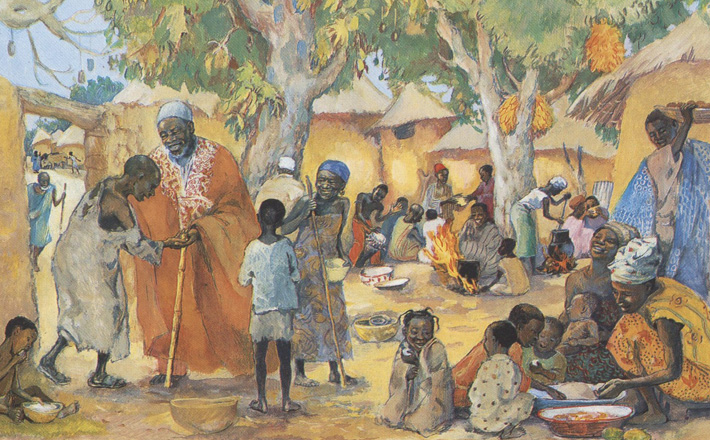Commentary on Proverbs 25:6-7
The lectionary-driven preacher is rarely invited to deliver a sermon based on a text from Proverbs.
Only a half dozen texts from that book appear in the Revised Common Lectionary. The Lutheran lectionary has even fewer, listing just three texts from Proverbs, including the one for today.
It’s clear that this Proverbs 25 text has been chosen because of its link with the Gospel for the day, Luke 14:1, 7-14. But the task here is to put this Proverbs text front and center, to seek a word for our own situation. First, a few words about wisdom literature in fairly recent Old Testament scholarship, then about the Book of Proverbs in general, and finally some consideration of Proverbs 25:6-7 and few words from a contemporary example of wisdom literature.
Wisdom literature in the Old Testament
Books classified as “wisdom literature” include Job, certain Psalms, Proverbs, Song of Solomon, and Ecclesiastes. The book of Proverbs is a collection of essays, poems, and sayings expressing the wisdom of ancient Israel. Some of the material originated as folk wisdom, circulating in the family or clan. Other portions (for example, Proverbs 22:17-24:22) appear to be designed for use in the royal court, intended for the instruction of young men who would become political leaders.
What was the content of this material? One does not need to deal with the “big questions” each day — such as the meaning of life or the problem of evil or why bad things happen to good people. In day-by-day living there are all sorts of smaller, but still important, questions: How should I handle my financial affairs? How should I relate to friends and colleagues? What about relationships to the opposite sex? What can I do to maintain a healthy marriage? How should I treat the widow, the orphan, the poor, the stranger, the aged? These are the sorts of things that Proverbs addresses. If the major theme of Psalms is praise of God in heaven, the chief concern of Proverbs is to aid in the pursuit of a good life on earth.
There are 31 chapters in Proverbs, thus suggesting the discipline of reading the chapter that matches the day of the month.
19th century study of the literature of the Old Testament began with the Pentateuch, then moved to consider the prophetic books. When I was doing graduate study in the Old Testament in the 1960’s, scholars were re-discovering the importance of wisdom literature and were studying that material with great energy. Especially in Germany, research on this material was bringing fresh insights. But few of the results of that study have made their way into the teaching and preaching of churches; note the comments about lectionaries above.
Structure of the book of Proverbs
We may outline Proverbs as follows:
- Title (1:1)
- Purpose (1:2-6) and thematic statement (1:7)
- Instructional essays (1:8–9:18)
- Sayings associated with Solomon (10:1–22:16)
- Words of the wise (22:17–24:22); here are many parallels from Egyptian literature, particularly The Wisdom of Amenemope
- More words from the wise (24:23-34)
- More sayings from Solomon (25:1–29:27)
- Words of Agur (30:1-33)
- Words of Lemuel and the ABC’s of a capable wife (31)
Proverbs 1:2-7 sets forth the purpose of the entire book. Here is instruction for the young, but also for senior citizens (verses 4-5), teaching the art of “steersmanship” (1:5, NRSV “skill”). Proverbs aims to provide instruction on how to navigate the ship of life through the sea of the world with its delights and dangers.
Proverbs 25:6-7
The sense of these two verses is clear. Young men who were being trained for positions of political leadership are given some advice on behavior at state dinners:
“When you sit down to eat with a ruler, observe carefully what is before you, and put a knife to your throat if you have a big appetite.”
The reason for not taking the best seats is to save yourself from embarrassment (25:7).
There are countless warnings against pride in the book of Proverbs: “Pride goes before destruction, and a haughty spirit before a fall” (16:18; see also 11:2; 29:23; 26:12, 27:2 etc.). One could nicely get into this material by studying the passages, which contrast the virtue of humility with the vice of pride. Or one could profitably study these themes in the entire Bible.
Warnings against pride in the Bible
The tower of Babel story tells of an arrogant people attempting to build a tower to reach to the place where God lives (Genesis 11). King Nebuchadnezzar boasts about his building achievements in Babylon and is immediately struck with a horrible disease (Daniel 4:28-33); Haman believes that he will win top honors in the Persian kingdom and discovers that the award goes to the humble Mordecai (Esther 6); Moving into the New Testament we hear Jesus giving his friends advice about seating at banquets (Luke 14, the Gospel for today); and we also hear them bickering about seating arrangements — in heaven! (Matthew 20:20-23; Mark 10:35-45)
The humility code: pride and humility
One of the best-selling non-fiction books of recent years has been The Road to Character by David Brooks (Random House, 2015). Much in the style of wisdom literature from the Bible he offers advice on how to live, and offers examples of persons illustrating that advice. I quote here from his comments on humility and pride:
In the struggle against your own weakness, humility is the greatest virtue…
Humility is having an accurate assessment of your own nature and your place in the cosmos. Humility reminds you that you are not the center of the universe, but you serve a larger order. (pp 262-3)
Pride is the central vice. Pride blinds us to our own weaknesses and misleads us into thinking we are better than we are … Pride deludes us into thinking that we are the authors of our own lives. (p. 263).
And a final comment from section 10: “We are all ultimately saved by grace … You are accepted … You just have to accept the fact that you are accepted. Gratitude fills the soul, and with it the desire to serve and give back.” (p. 265). Not far, one might say, from the Gospel.


August 28, 2016